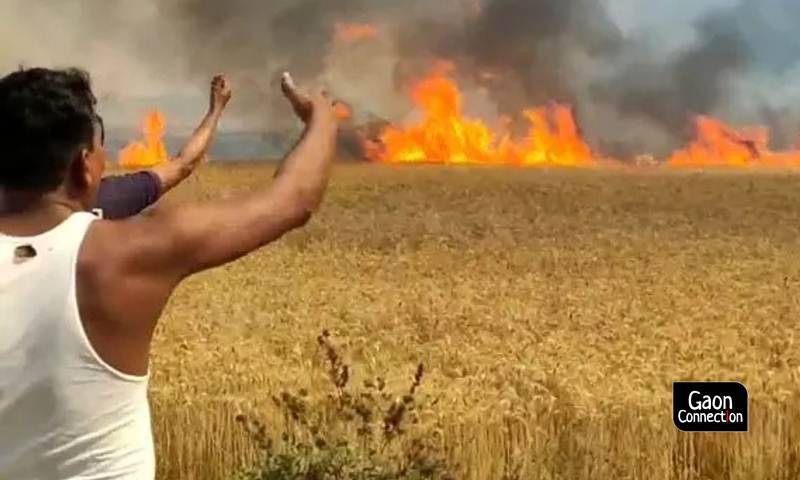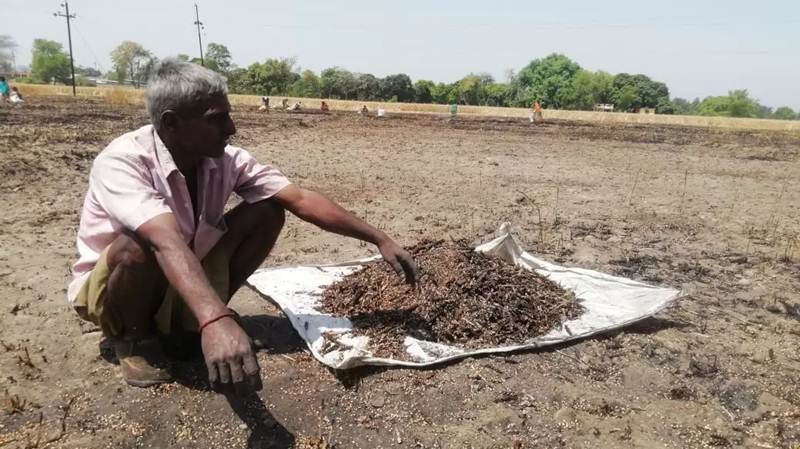Fields on fire: 1,500 fire incidents a day in Uttar Pradesh; heavy damage to standing wheat crop
In cases of crop fires, the most common reasons include broken power cables, electricity supply wires, tractor sparks, fire from stoves, careless smoking, and fireworks — and these fires cost dearly to the farmers whose livelihoods depend on these crops.


In fires like these, the cause is mostly broken electricity wires or cigarette/beedi stubs that are carelessly thrown away after smoking. Photos by arrangement.
Lucknow, Uttar Pradesh
The festival of colours Holi had just got over and 44-year-old Ram Kishor was busy with guests at his home in Malmau village, when on March 30 morning he received the most devastating news.
His wheat crop, standing tall on his one hectare farmland in Unnao district, 70 kms from state capital Lucknow, was on fire.
Before Kishor, his fellow villagers or the fire-engines could reach the spot, his entire crop spread was burnt to ashes.
In a matter of minutes, Kishor lost his wheat crop worth Rs 40,000. He had spent the last five months tending to it.

“Not even a single grain of wheat survived. We have nothing to eat for the entire year now. We depended on our harvest for livelihood,” his eyes fixed at his burnt field, a disheartened Kishor told Gaon Connection.
Also Read: They live along the canal but their farmlands go dry
In Uttar Pradesh, the months between March and June are infamous for high fire incidents. According to the Uttar Pradesh Fire Service control room in Lucknow, on an average, 1,500 fire-related incidents are daily reported in these months across the state.
Majority of the cases entail crop fires like the one witnessed in Malmau village, a day after Holi, when standing crop over 3.5 hectares of fields was wiped off in minutes. Many farmers like Kishor suffered heavy losses.

The culprit was a live electricity wire that broke up due to stormy winds and fell on the ground, igniting the dry crop which was to be harvested.
In fires like these, the cause is mostly broken electricity wires or cigarette/beedi stubs that are carelessly thrown away after smoking.
Also Read: Stubble Trouble – Air quality dips in Delhi; spotlight shifts to farmers in Punjab and Haryana
“Most of the fire incidents are reported during the westerly winds in the rural areas. We have written to the electricity department to come up with a measure so that wires don’t break during strong winds. Also, people need to be made aware as well,” Raj Prakash Rai, chief fire officer, Barabanki told Gaon Connection.
The state Chief Minister Yogi Adityanath has directed the officials to be especially vigilant about fire incidents during the summer months. “The victims of fire related incidents have to be compensated within 24 hours,” he had said while interacting with officials.
Controlling fire incidents
According to official data accessed by Gaon Connection, there are 350 fire stations functioning across the state while 70 more are in the process of being set up. Also, there are a total of 940 fire engines available in Uttar Pradesh.
Also Read: Poultry farmers refurbish junk refrigerators as hatcheries
Another official from the fire department told Gaon Connection on the condition of anonymity: “We are extra-vigilant during the summer months. There are various places in the hinterland where fire offices or stations do not exist. In such a location, we place a unit (a fire engine and 3-4 firemen) at the local police stations and they can cover an area of 20 km-30 km radius.”
The damage report from fire related incidents is shared with the fire services headquarters every 15 days. Gaon Connection approached Lucknow fire services headquarters to avail information on these reports but due to unavailability of the Director General at the office, officials refused to share information.

